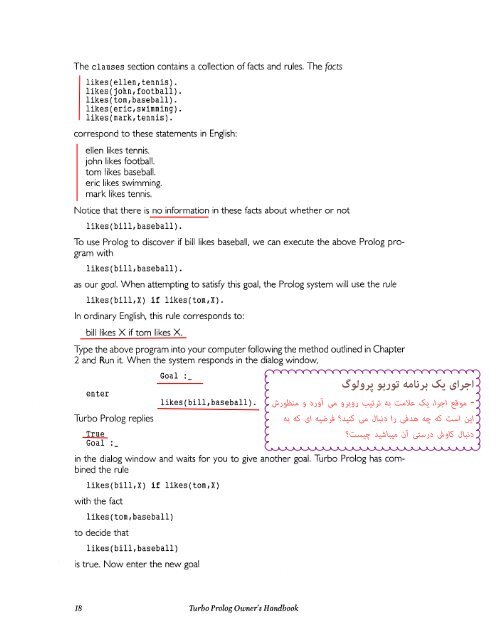Turbo Prolog
Turbo Prolog
Turbo Prolog
Create successful ePaper yourself
Turn your PDF publications into a flip-book with our unique Google optimized e-Paper software.
The clauses section contains a collection of facts and rules. The facts<br />
likes(ellen,tennis).<br />
likes(john,football).<br />
likes(torn,baseball).<br />
likes(eric,swirnrning).<br />
likes(rnark,tennis).<br />
correspond to these statements in English:<br />
ellen likes tennis.<br />
john likes football.<br />
tom likes baseball.<br />
eric likes swimming.<br />
mark likes tennis.<br />
Notice that there is no information in these facts about whether or not<br />
likes(bill,baseball).<br />
To use <strong>Prolog</strong> to discover if bill likes baseball, we can execute the above <strong>Prolog</strong> program<br />
with<br />
likes(bill,baseball).<br />
as our goal. When attempting to satisfy this goal, the <strong>Prolog</strong> system will use the rule<br />
likes(bill,X) if likes(torn,X).<br />
In ordinary English, this rule corresponds to:<br />
bill likes X if tom likes X.<br />
Type the above program into your computer following the method outlined in Chapter<br />
2 and Run it. When the system responds in the dialog window,<br />
enter<br />
<strong>Turbo</strong> <strong>Prolog</strong> replies<br />
True<br />
Goal :<br />
Goal :<br />
likes(bill,baseball).<br />
in the dialog window and waits for you to give another goal. <strong>Turbo</strong> <strong>Prolog</strong> has combined<br />
the rule<br />
likes(bill,X) if likes(torn,X)<br />
with the fact<br />
likes(torn,baseball)<br />
to decide that<br />
likes(bill,baseball)<br />
is true. Now enter the new goal<br />
18 <strong>Turbo</strong> <strong>Prolog</strong> Owner's Handbook


